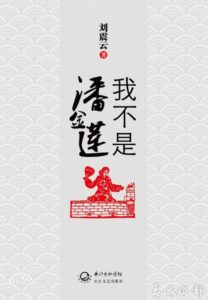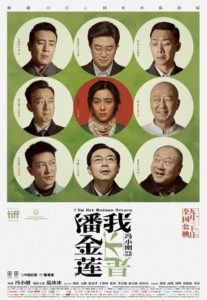I Am Not Madame Bovary
我不是潘金莲
China, 2016, colour, 2.35:1, 137 mins.
Director: Feng Xiaogang 冯小刚.
Rating: 8/10.
Hitmeister Feng Xiaogang is on form with this black comedy on miscommunication and petty officialdom.
A village somewhere in central China, some 10 years or so ago. Li Xuelian (Fan Bingbing), the owner of a beef-soup restaurant, seeks the help of a local judge, Wang Gongdao (Da Peng), whom she claims is a distant relative. Last year she and her husband, Qin Yuhe (Li Zonghan), went through a fake divorce in order to get a flat in the county capital; but she then found Qin Yuhe moved into the flat with another woman. She wants to bring a lawsuit against him to prove their divorce was only fake, so she can then remarry him and divorce him properly, in order to save face. The judge agrees to hear her case but the court rules the divorce was real. Li Xuelian then doorstops a senior judge, Xun Zhengyi; the county head, Shi Weimin (Zhao Lixin); and the mayor of Yong’an municipality, Cai Hubang – but all slide out of dealing with her. She finally decides to drop the case, but first goes to see Qin Yuhe face to face. He still won’t admit the divorce was fake, and even accuses her of being a “Pan Jinlian” (a loose woman), as she wasn’t a virgin when they married. More insulted by this than by the matter of the fake divorce, Li Xuelian decides to murder him, but both the men she asks for help – her younger brother Li Yinggong and local butcher Hu (Liu Hua), who’s always liked her – turn her down. She decides to take her case to Beijing, where a session of the National People’s Congress is about to start, and asks the help of a cousin, Zhao Jingli, aka Datou (Guo Tao), who’s a government chef. She doorstops a senior official (Gao Ming), who then uses her story to berate his subordinates at a delegates’ meeting. Ten years later, nothing has progressed, despite Li Xuelian going to Beijing at the time of the NPC session every year. After listening to her cow, this year she’s decided not to go. But Wang Gongdao, new mayor Ma Wenbin (Zhang Jiayi) and new county head Zheng Zhong (Yu Hewei) – all of whom are feeling the heat from Beijing as another NPC looms – don’t believe her. Ma Wenbin tries a different approach, and then Datou, who’s now a widower, turns up in the village with a proposal.
REVIEW
A smalltown working woman takes on the might of her country’s bureaucracy in I Am Not Madame Bovary 我不是潘金莲, a straightfaced black comedy by veteran Mainland hitmeister-cum-social satirist Feng Xiaogang 冯小刚 that reteams him with Henan-born writer Liu Zhenyun 刘震云, one of his most fruitful collaborators across some 20 years. Apart from writing the TV drama Chicken Feathers Everywhere 一地鸡毛 (1995) and films Cell Phone 手机 (2003) and Back to 1942 一九四二 (2012), Liu, 58, was also involved in a non-writing capacity with two other Feng hits (Party A, Party B 甲方乙方, 1997; A World without Thieves 天下无贼, 2004), and his creative lucky star carries over to Bovary. Led by a neutral performance from a de-glammed Fan Bingbing 范冰冰, and gaining its texture from a mass of male cameos as friends and officals, Bovary could have made the same points at a trimmer 110 minutes but is always an engrossing journey, with none of the ups and downs of his last movie, the flashier satire Personal Tailor 私人订制 (2013).
Perhaps inspired by the recent play with aspect ratios by Hou Xiaoxian 侯孝贤 (in The Assassin 刺客聂隐娘, 2015) and Jia Zhangke 贾樟柯 (Mountains May Depart 山河敌人, 2015), Feng has cheekily used the popular silent-cinema technique of the “iris shot” in  some 80% of the film, using a circular cut-out within a black widescreen for all scenes in Li Xuelian’s hometown. For those in Beijing, a vertical, scroll-like aspect ratio is used; and for the coda in the present day the ratio memorably expands to its full 2.35:1 as the camera moves through the doors of her new restaurant. What initially seems an affectation actually works well: the iris shot could be
some 80% of the film, using a circular cut-out within a black widescreen for all scenes in Li Xuelian’s hometown. For those in Beijing, a vertical, scroll-like aspect ratio is used; and for the coda in the present day the ratio memorably expands to its full 2.35:1 as the camera moves through the doors of her new restaurant. What initially seems an affectation actually works well: the iris shot could be  said to underline the artificiality of the story as well as Li Xuelian’s small, local universe. Without becoming over-academic, Feng also echoes silent-movie techniques with long takes and plenty of medium and long shots; the one time when he directly plays with the effect in a modern way (having the actors step outside the iris, and then panning to denote a passage of time) is amazingly powerful. The use of a vertical aspect ratio for the Beijing scenes is more questionable, with no obvious meaning beyond a slight broadening of Li Xuelian’s horizons.
said to underline the artificiality of the story as well as Li Xuelian’s small, local universe. Without becoming over-academic, Feng also echoes silent-movie techniques with long takes and plenty of medium and long shots; the one time when he directly plays with the effect in a modern way (having the actors step outside the iris, and then panning to denote a passage of time) is amazingly powerful. The use of a vertical aspect ratio for the Beijing scenes is more questionable, with no obvious meaning beyond a slight broadening of Li Xuelian’s horizons.
Satirising petty officialdom and bureaucracy is hardly a new subject in Mainland cinema, but the tone of Bovary is more The Marriage Certificate 谁说我不在乎 (Huang Jianxin 黄建新, 2001) than The Story of Qiu Ju 秋菊打官司 (Zhang Yimou 张艺谋, 1992). Unlike Qiu Ju, there’s no realist agenda to the film: from Feng’s opening narration, through the slightly exaggerated performances, to the film’s play with aspect ratios, Bovary has a deliberately stylised feel rather than a documentary-like one. And like Marriage Certificate, centring on a couple whose lives go into meltdown when they lose the all-important document, the black comedy springs from the central absurdity of the situation and the way in which it spirals out of control.
 Adapted by Liu from his own 2012 novel, the script follows Li Xuelian who claims she went though a fake divorce from her husband in order to qualify for a better flat and was then cheated by him when he moved into it with another woman. (Manipulating one’s marital status is not uncommon in China to get around property regulations.) The central absurdity is that Li Xuelian wants to prove the divorce was fake so she can re-marry her husband and then divorce him properly, i.e gain face and what she sees as personal justice. As she pushes her complaint up the ladder – from a local judge to the county head to the municipality’s mayor and then to Party delegates at the annual National People’s Congress session in Beijing – the fact that she bent the law in the first place by going through a fake divorce is never seen as important.
Adapted by Liu from his own 2012 novel, the script follows Li Xuelian who claims she went though a fake divorce from her husband in order to qualify for a better flat and was then cheated by him when he moved into it with another woman. (Manipulating one’s marital status is not uncommon in China to get around property regulations.) The central absurdity is that Li Xuelian wants to prove the divorce was fake so she can re-marry her husband and then divorce him properly, i.e gain face and what she sees as personal justice. As she pushes her complaint up the ladder – from a local judge to the county head to the municipality’s mayor and then to Party delegates at the annual National People’s Congress session in Beijing – the fact that she bent the law in the first place by going through a fake divorce is never seen as important.
Face-saving, passing the buck, protecting your back, maintaining the status quo, getting a good deal, and so on, are what drive the various levels of society in Bovary – and not only officials. When she tries to hang herself from a tree, the owner (Fan Wei 范伟, in a witty cameo) politely asks her to use his competitor’s orchard instead, as the bad publicity could ruin his business; and when she tries to recruit help in murdering her husband, a butcher agrees in return for a sexual favour but demurs when she adds more victims to her list.
Liu and Feng’s point is how a finely-balanced social and political system can be upset by an apparently tiny stand on principle, and how people can talk to each other without actually communicating. The film, to its credit, never gets preachy: Li Xuelian pursues her cause with an earthy singlemindedness, not like some hysterical social-justice warrior, and her cause is exploited (as well as sidetracked or simply misunderstood) by both bureaucrats and ordinary people. One of the funniest scenes is a senior NPC politician (Gao Ming 高明) lecturing his subordinates on their incompetence while still staying clear of the mess himself; and a couple of men who’ve always fancied her also try to extract their pound of flesh. The film could also be read as a single woman’s struggle against an entrenched male power system, but it’s never explicit as such.
At the end of the day, however, the film is more about miscommunication and a whole social and bureaucratic structure than simply Li Xuelian – a fact that seems to be acknowledged by Fan’s neutral performance and the way in which she’s framed, with few close-ups. Feng, who previously cast her in a supporting role (as the first mistress) in Cell Phone, seems to know her limitations, and by adopting a kind of fake “silent-cinema” approach – lots of medium and long shots, the iris effect, and so on – never tries to involve the viewer emotionally in her dilemma. It’s notable that the most moving scene in the whole film is at the end, set in the present day and in widescreen, when the camera moves closely in on her rather than remining formally distant. Otherwise, the cool Fan is OK in peasanty garb and make-up but doesn’t really create a character to empathise with.
Among the roster of name supports – apart from Fan and Gao – major kudos goes to comedian Da Peng 大鹏 (Jianbing Man 煎饼侠, 2015), almost unrecognisable without his trademark big specs, as the first judge she consults, a role played with an absolutely straight face. Ditto wry comic Guo Tao 郭涛, as a Beijing chef with an agenda of his own. Photography by Luo Pan 罗攀 – who shot last year’s Mr. Six 老炮儿, in which Feng played the title role – has a kind of flat quality that sits well with the iris-shot concept. The score by Du Wei 杜薇 is propulsively percussive in the first half, as Li Xuelian aggressively pursues her case, and more lyrical, traditional Chinese in the second half, as she retreats.
The film is almost a companion piece to another adaptation of a Liu novel that was released a fortnight before Bovary: the drama Someone to Talk To 一句顶一万句, directed by Liu Yulin 刘雨霖, centred on a young couple’s failing marriage and lack of communication. Bovary‘s Chinese title literally means “I Am Not Pan Jinlian”, referring to a femme fatale in the erotic classic The Golden Lotus 金瓶梅 who cuckolded and poisoned her husband and was later murdered. A popular character in Chinese films and TVDs, the lián 莲 (“lotus”) in her name is the same as that in Li Xuelian 李雪莲 – thus making it doubly insulting when her husband accuses her of being “a Pan Jinlian” because she wasn’t a virgin when they married.
Considering the film’s non-commercial style, its box-office tally of RMB475 million was even more considerable, on a par with Feng’s much more mainstream If You Are the One II 非诚勿扰II (2010; RMB456 million), though below Aftershock 唐山大地震 (2010; RMB650 million) and Personal Tailor (RMB714 million). All, however, were dwarfed by Mr. Six (RMB903 million), in which Feng starred but which he did not direct.
CREDITS
Presented by Beijing Sparkle Roll Media (CN), Huayi Brothers Media (CN), Beijing Skywheel Entertainment (CN), Huayi Brothers Pictures (CN), Zhejiang Dongyang Mayla Media (CN).
Script: Liu Zhenyun. Novel: Liu Zhenyun. Photography: Luo Pan. Editing: Zhang Shuping [William Chang]. Music: Du Wei. Art direction: Han Zhong. Sound: Wu Jiang.
Cast: Fan Bingbing (Li Xuelian), Guo Tao (Zhao Jingli/Datou), Da Peng [Dong Chengpeng] (Wang Gongdao, local judge), Zhang Jiayi (Ma Wenbin, new mayor), Yu Hewei (Zheng Zhong, new county head)), Zhang Yi (Jia Congming, presiding judge), Li Zonghan (Qin Yuhe), Zhao Lixin (Shi Weimin, county head), Fan Wei (fruit farmer), Gao Ming (senior central official), Liu Hua (Hu, butcher), Huang Jianxin (Chu Jinglian, provincial governor), Li Chen (policeman), Feng Xiaogang (narrator), Tian Xiaojie.
Premiere: Toronto Film Festival (Special Presentation), 8 Sep 2016.
Release: China, 18 Nov 2016.
